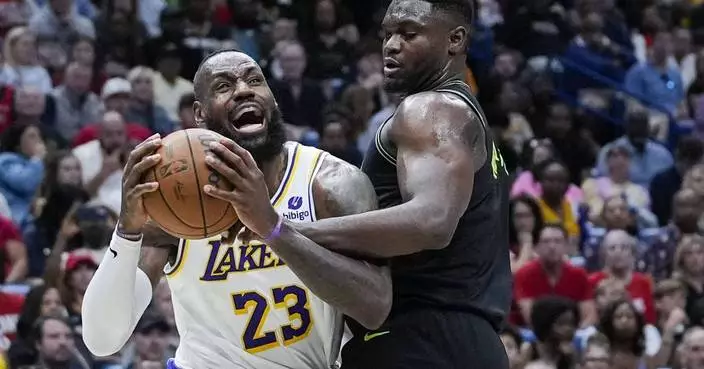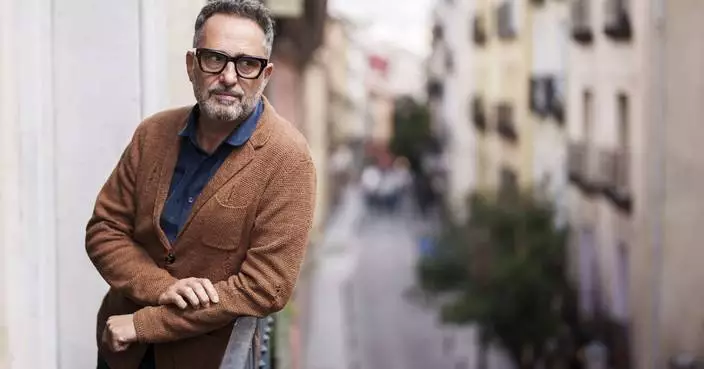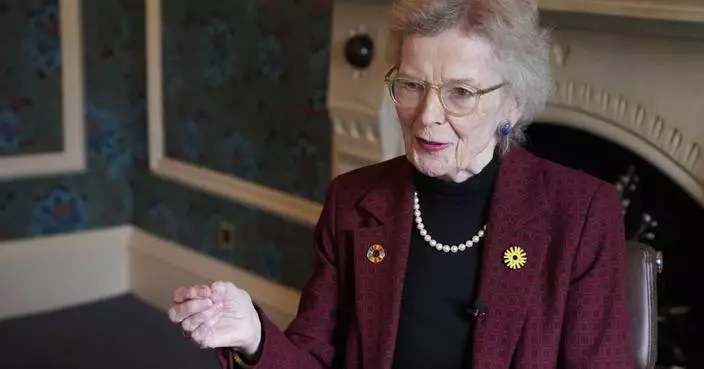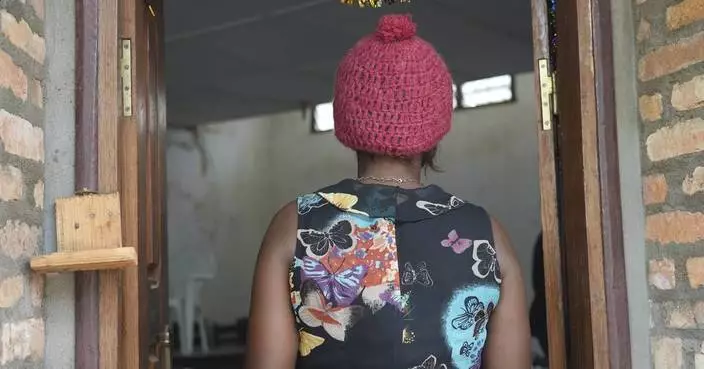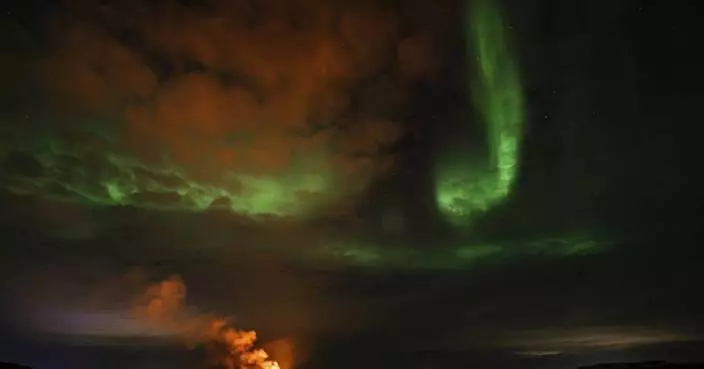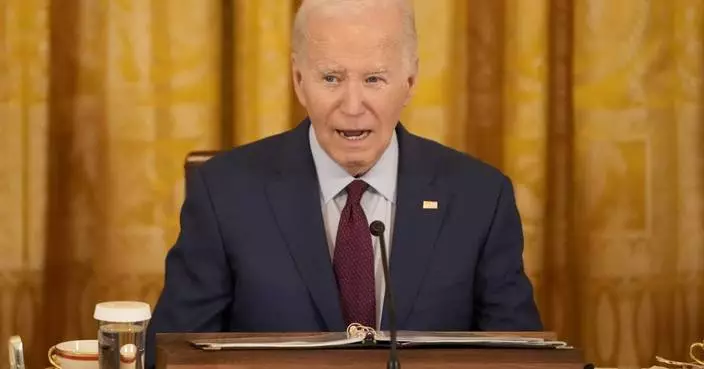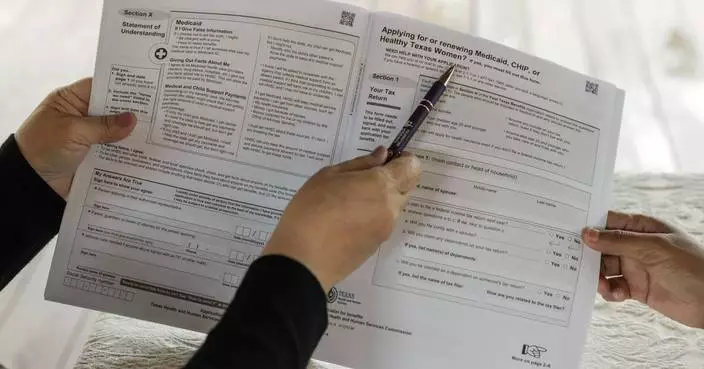Charging an electric car away from home can be an exercise in uncertainty — hunting for that one lonely station at the back of a rest-area parking lot and hoping it's working.
In Europe, some of the biggest automakers are out to remove such anxieties from the battery-only driving experience and encourage electric-vehicle sales by building a highway network of fast charging stations. The idea is to let drivers plug in, charge in minutes instead of hours, and speed off on their way — from Norway to southern Italy and Portugal to Poland.
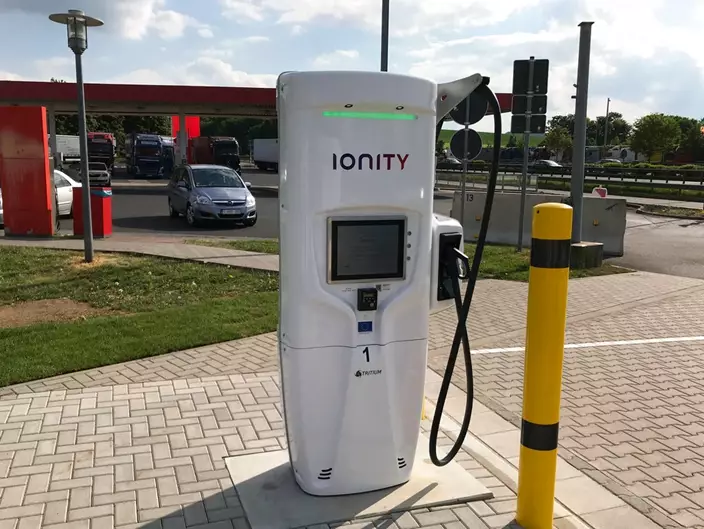
In this Friday, May 11, 2018 photo a Ionity charging station sits at the rest stop Brohltal Ost at the A61 motorway in Niederzissen, Germany. Munich-based Ionity build a highway network of fast charging stations that will let drivers plug in, charge in minutes instead of hours, and speed off on their way, from Norway to southern Italy and Portugal to Poland (AP Photo/Ferdinand Ostrop)
Much is at stake for the automakers, which include Volkswagen, BMW, Daimler and Ford. Their joint venture, Munich-based Ionity, is pushing to roll out its network in time to service the next generation of battery-only cars coming on the market starting next year. They're aiming to win back some of the market share for electric luxury car sales lost to Tesla, which has its own, proprietary fast-charging network.
Despite a slower-than-expected start, Ionity CEO Michael Hajesch told The Associated Press in an interview he's "confident" the company will reach its goal of 400 ultra-fast charging stations averaging six charging places each by 2020.
The idea is "to be able to drive long distances with battery electric vehicles, across Europe and to have the same experience at each station, meaning a very easy and comfortable customer journey," Hajesch said, speaking at the company's Munich headquarters near the 1972 Olympic stadium.
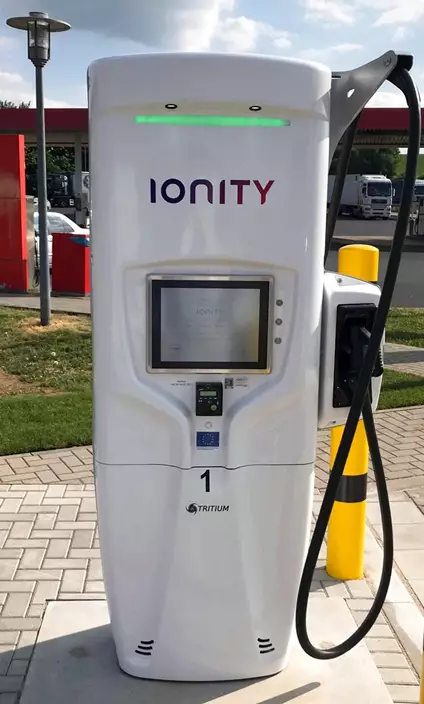
In this Friday, May 11, 2018 photo a Ionity charging station sits at the rest stop Brohltal Ost at the A61 motorway in Niederzissen, Germany. (AP Photo/Ferdinand Ostrop)
The idea is to break electric cars out of the early adopter niche, in which they are charged slowly overnight at home and used for short commutes.
"The sites we are looking for are really the A-sites," he said, "directly at the autobahn. Not down the road, not driving five kilometers into the next industrial area and finding a charging station somewhere, without light, or any amenities around, but right at the autobahn."
"If you're going from Hamburg to Munich, because it's a weekend trip to friends, typically you do not have much time," he said. So what counts will be "the speed of recharging your vehicles, and at the same time finding maybe some amenities: maybe a coffee, getting a newspaper or whatever."
Ionity opened its first station April 17 at a rest stop off the A61 highway near the small town of Niederzissen, 50 kilometers (30 miles) south of Bonn in western Germany. The six high-speed chargers are operating in "welcome mode," meaning they're free until May 31. After that, Ionity plans to charge for the power, which it seeks to obtain from renewable sources.
Ionity has agreements for some 300 sites, working with fueling station and rest stop landlords. The average distance between stations will be 120 kilometers (75 miles).
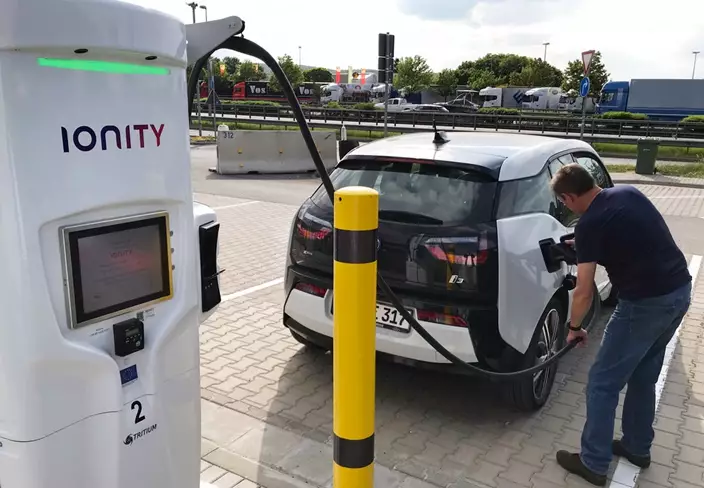
In this Friday, May 11, 2018 photo a man charges his BMW electric vehicle at the rest stop Brohltal Ost at the A61 motorway in Niederzissen, Germany. Munich-based Ionity build a highway network of fast charging stations that will let drivers plug in, charge in minutes instead of hours, and speed off on their way, from Norway to southern Italy and Portugal to Poland (AP Photo/Ferdinand Ostrop)
More charging availability is what it will take to get an environmentally aware car buyer like Rainer Hoedt to choose a battery-only vehicle. The 58-year-old Berlin geography teacher is a proud owner of a Mitsubishi Outlander, a plug-in hybrid that combines internal combustion with a battery he can charge overnight. The battery-only range of 50 kilometers (30 miles) lets him drive emissions free for daily trips at home.
But a family vacation of more than 200 kilometers (120 miles) to the Baltic Sea was a different story.
Hoedt had to drive on internal combustion before finding a lone charging station as he approached his destination, using the goingelectric.de website.
"It was right next to the highway, there was one charging station and we were lucky that it was free," he said. But he couldn't find a charging station he could use by the seashore.
On the way back, he was able to charge at a rest stop, but only by asking a non-electric car owner to move his vehicle away from the lone charging pole. A battery-only car might never have made it home.
And he couldn't use one to visit his cousin 650 kilometers (400 miles) away in Rosenheim.
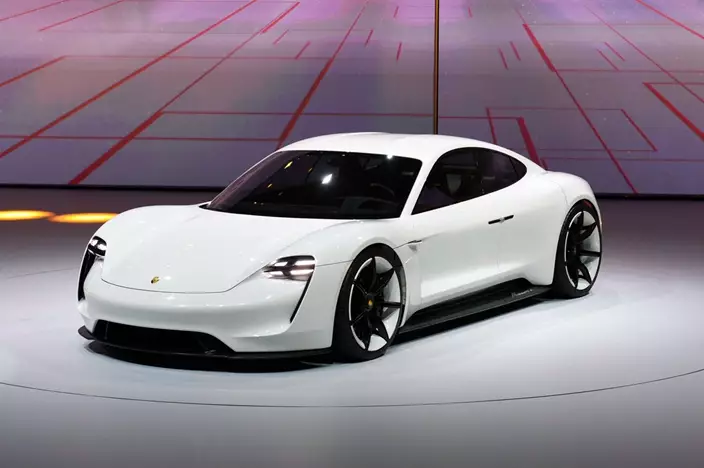
FILE - In this Monday, Sept. 14, 2015 file photo, a Porsche Mission E is presented during the Volkswagen group night on the eve of the Frankfurt Auto Show IAA in Frankfurt, Germany. Charging an electric car away from home can be an exercise in uncertainty - hunting for that one lonely station at the back of a rest-area parking lot and hoping it’s working. (AP Photo/Jens Meyer, file)
"I looked at the option... The infrastructure is still so bad, I just don't want to risk that I get stranded," he said. "Once the infrastructure gets better, that might be my next car."
Tesla has shown how charging infrastructure can drive vehicle sales. It has 1,229 stations with 9,623 fast chargers in Europe alone, where it has cut into Mercedes and BMW's sales of luxury cars. But it has its own proprietary plug. Ionity is using the CCS plug backed by the European Union as a common standard for all.
In both the U.S. and Europe, the situation is roughly similar: More chargers available in jurisdictions where government strongly backs electric vehicles, such as California, Norway or the Netherlands. Elsewhere, chargers get can harder to find for long stretches along rural highways.
Volkswagen, which agreed to invest in low-emission driving to settle charges it cheated on diesel emissions, is building 300 highway charging sites in the U.S. by June 2019 through its Electrify America unit. Japan has 40,000 charging points, exceeding its 34,000 gas stations, according to Nissan — but many of those are private garages.
Ionity is counting on the large 350-kilowatt capacity of its publicly available chargers — almost three times the 120 kilowatts per vehicle of Tesla's Superchargers. No car currently on the market can make full use of 350 kilowatt charging capacity. But they're coming: in 2019 Porsche plans to introduce the Mission E. Porsche says that the sleek, low-slung sports car will take 15 minutes to charge for 400 kilometers (250 miles) more driving.
Tesla and its founder, Elon Musk, "showed it's not enough to just build electric cars" without also building charging infrastructure, said Ferdinand Dudenhoeffer, director of the CAR Center Automotive Research at the University of Duisberg-Essen.
The automakers "are late, but it's better than it was... it remains the case that without Elon Musk the carmakers would not have realized this," he said.
ANDEREN, Netherlands (AP) — Inside the barn on the flat fields of the northern Netherlands, Jos Ubels cradles a newborn Blonde d'Aquitaine calf, the latest addition to his herd of over 300 dairy cattle.
Little could be more idyllic.
Little, says Ubels, could be more under threat.
As Europe seeks to address the threat of climate change, it's imposing more rules on farmers like Ubels. He spends a day a week on bureaucracy, answering the demands of European Union and national officials who seek to decide when farmers can sow and reap, and how much fertilizer or manure they can use.
Meanwhile, competition from cheap imports is undercutting prices for their produce, without having to meet the same standards. Mainstream political parties failed to act on farmers’ complaints for decades, Ubels says. Now the radical right is stepping in.
Across much of the 27-nation EU, from Finland to Greece, Poland to Ireland, farmers' discontent is gathering momentum as June EU parliamentary elections draw near.
Ubels is the second in command of the Farmers Defense Force, one of the most prominent groups to emerge from the foment. The FDF, whose symbol is a crossed double pitchfork, was formed in 2019 and has since expanded to Belgium. It has ties to similar groups elsewhere in the EU and is a driving force behind a planned June 4 demonstration in Brussels it hopes will bring 100,000 people to the EU capital and help define the outcome of the elections.
“It is time that we fight back,” said Ubels. “We’re done with quietly listening and doing what we are told.”
Has he lost trust in democracy? “No. … I have lost my faith in politics. And that is one step removed.”
The FDF itself puts it more ominously on its website: “Our confidence in the rule of law is wavering!”
This story, supported by the Pulitzer Center for Crisis Reporting, is part of an ongoing Associated Press series covering threats to democracy in Europe.
In March, protesting farmers from Belgium ran amok at a demonstration outside EU headquarters in Brussels, setting fire to a subway station entrance and attacking police with eggs and liquid manure. In France, protesters tried to storm a government building.
In a video from another protest, in front of burning tires and pallets, FDF leader Mark van den Oever said two politicians made him sick to his stomach, saying they would "soon be at the center of attention.” The FDF denies this was a threat of physical violence.
Across the EU, over the winter, tractor convoys blockaded ports and major roads, sometimes for days, in some of the most severe farm protests in half a century.
Farmers and the EU have had a sometimes testy relationship. What's new is the shift toward the extreme right.
Destitute after World War II and with hunger still a scourge in winter, Europe desperately needed food security. The EU stepped in, securing abundant food for the population, turning the sector into an export powerhouse and currently funding farmers to the tune of over 50 billion euros a year.
Yet, despite agriculture's strategic importance, the EU acknowledges that farmers earn about 40% less than non-farm workers, while 80% of support goes to a privileged 20% of farmers. Many of the bloc's 8.7 million farm workers are close to or below the poverty line.
At the same time, the EU is seeking to push through stringent nature and agricultural laws as part of its Green Deal to make the bloc climate-neutral by 2050. Agriculture accounts for more than 10% of EU greenhouse gas emissions, from sources such as the nitrous oxide in fertilizers, carbon dioxide from vehicles and methane from cattle.
Cutting these emissions has forced short-notice changes on farmers at a time of financial insecurity. The COVID-19 pandemic and surging inflation have increased the cost of goods and labor, while farmers' earnings are down as squeezed consumers cut back.
And then there's the war next door. After Russia's full-scale invasion in February 2022, the EU granted tariff-free access for agricultural imports from Ukraine, many of them exempt from the strict environmental standards the bloc enforces on its own producers. Imports surged from 7 billion euros in 2021 to 13 billion euros the following year, causing gluts and undercutting farmers, particularly in Poland.
“Don't let up,” Marion Maréchal, the lead candidate for France's extreme right Reconquest! party in the June elections, exhorted farmers at a protest earlier this year. “You have to be in the streets. You have to make yourself heard. You have to —” she tried to finish the sentence but was drowned out by shouts of “Don't Let Up! Don't Let Up!”
Farming in Europe is about more than just food; it touches on identity. In France, the far right taps into the love of “terroir,” that mythical combination of soil, location, culture and climate.
“The French realize that the farmers are the roots of our society," said Maréchal.
Such sentiments echo across Europe. In Ireland, where more than a million people died in the famine of 1845-1852, farming "is deep in our culture, in our psyche,” said Environment Minister Eamon Ryan, a Green Party lawmaker.
The far right has used farming as a way to attack mainstream parties. In Italy, the far right has mocked the EU's efforts to promote a low-carbon diet, playing on farmers' fears that lab-grown proteins and insects could one day replace meat.
“Revolt is the language of those who are not listened to. Now, back off,” warned far-right Italian lawmaker Nicola Procaccini in February. In a few months, he said, the European elections "will put people back in place of ideologies.”
Such calls fall on fertile ground. According to predictions by the European Council on Foreign Relations, the radical right Identity and Democracy group could become the third biggest overall in the next European Parliament, behind the Christian Democrats and the Socialists, but edging out the Liberals and Greens. The farm protests are providing vital leverage.
One farmer sidestepping militant demonstrations is Bart Dochy in western Belgium. As the Christian Democrat mayor of the farming town of Ledegem and a regional parliamentarian in Flanders, he represents the traditional forces in European farming communities: Christianity and conservativism. When Socialism took the big cities, the countryside and its farmers remained staunchly Christian Democrat.
That's now changed. Once, billboards with the cry, “Save our farmers!” would have come from his party; now, they bear the logo of the far-right Flemish Interest, predicted by polls to become the biggest party in Belgium in June.
“In a sense it is only logical that the extreme parties have specialized in capturing that discontent. They call a spade a spade. And that is good,” he said. But farming is complicated, he warned: nature, trade, budgets, commodity prices and geopolitics are all involved. Solutions will have to come from common sense, "not from the extremes.”
Dochy's Christian Democrats are part of the biggest group in the EU parliament, the European People's Party, once a strong proponent of the EU's Green Deal. Farmers, after all, are among the biggest losers from climate change, affected at different times by flooding, wildfires, drought and extreme temperatures.
But ever since the demonstrations started, EU politics on agriculture and climate have shifted rightwards, outraging many of the center right’s old allies with whom it set up the Green Deal. Measures to reduce pesticide use and protect biodiversity have been weakened, while the protesters' demands to cut regulation have been heard.
But as the rhetoric heats up, so too does the climate. Data for early 2024 shows record-breaking temperatures in Europe. In Greece — where an estimated 1,750 square kilometers (675 square miles) burned in 2023, the worst fire in EU records — wildfires are already breaking out, weeks earlier than expected.
The far right offers no detailed solutions to the climate crisis but it has proved adept at tapping into farmers’ frustrations. In its program for the June elections, the Dutch far-right party, the PVV, is short on details but big on slogans about “climate hysteria” and its “tsunami of rules.” Nature and climate laws, it said, “should not lead to whole sectors being forced into bankruptcy.”
Ubels made the case for farmers' realpolitik.
“The government doesn't listen to us, but the opposition does,” he said.
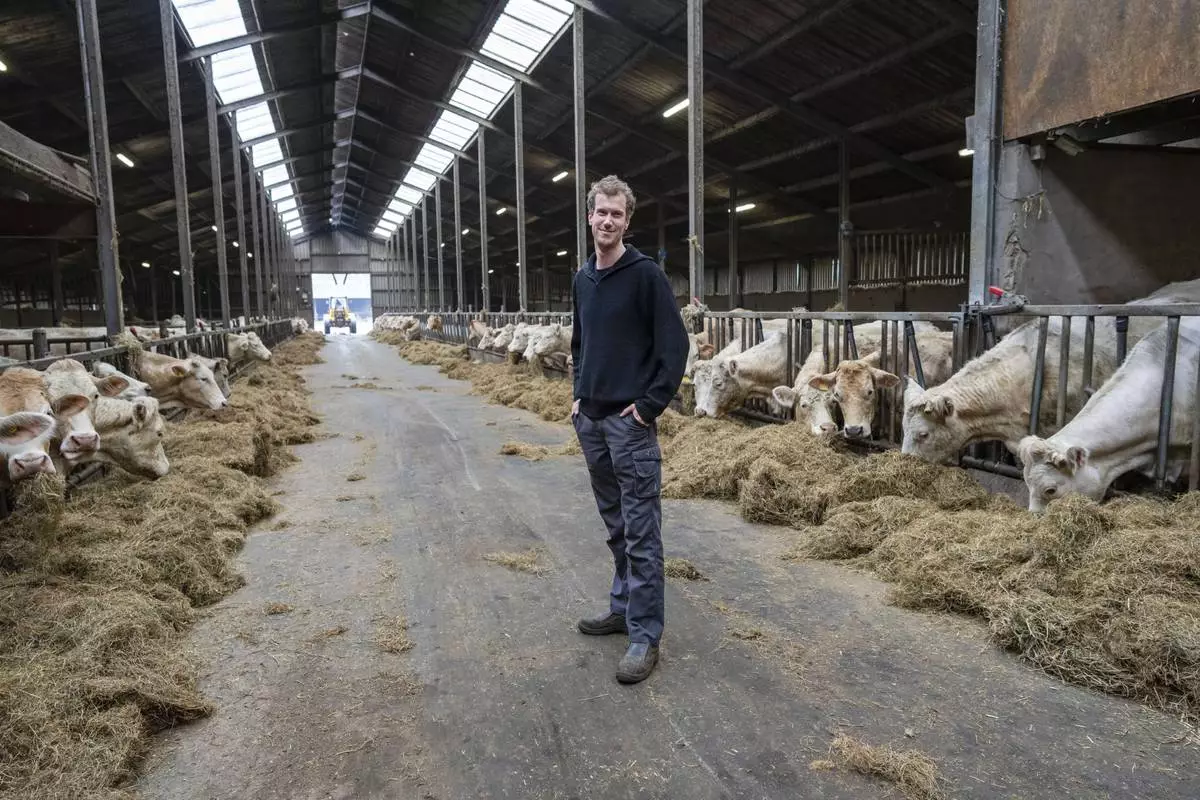
Farmer's Defense Force vice president Jos Ubels poses for a portrait at his farm in Anderen, Northern Netherlands, Monday, March 18, 2024. Ubels feels that everything from overbearing bureaucrats insisting when farmers should sow or harvest, imposing excessive restrictions on fertilizer and manure use and unfair international competition condoned by the European Union have created a potent mix that has driven him away from mainstream politics. (AP Photo/Peter Dejong)
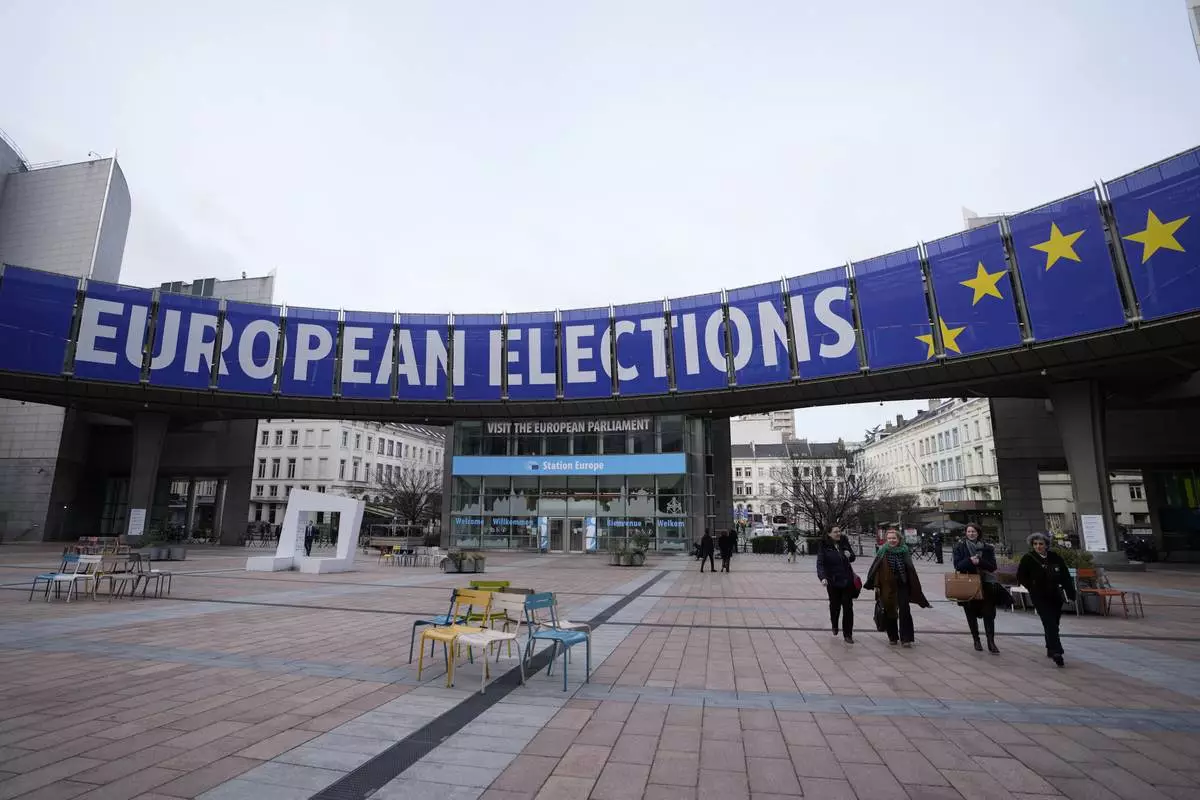
FILE - People walk under a banner advertising the European elections outside the European Parliament in Brussels, on Jan. 24, 2024. The Farmers Defense Force and partners plan to hold one more massive protest of farmers close to EU headquarters in Brussels on June 4. Voting for the elections starts two days later. (AP Photo/Virginia Mayo, File)

FILE - Belgian Farmer and politician, Bart Dochy, stands in front of tractors in a barn at his family farm in Ledegem, Belgium, on Feb. 13, 2024. As the Christian Democrat mayor of the farming town of Ledegem and a parliamentarian, Dochy represents the powers that have always been dominant in farming communities for centuries in large swathes of Europe, Christian and Conservative. (AP Photo/Virginia Mayo, File)
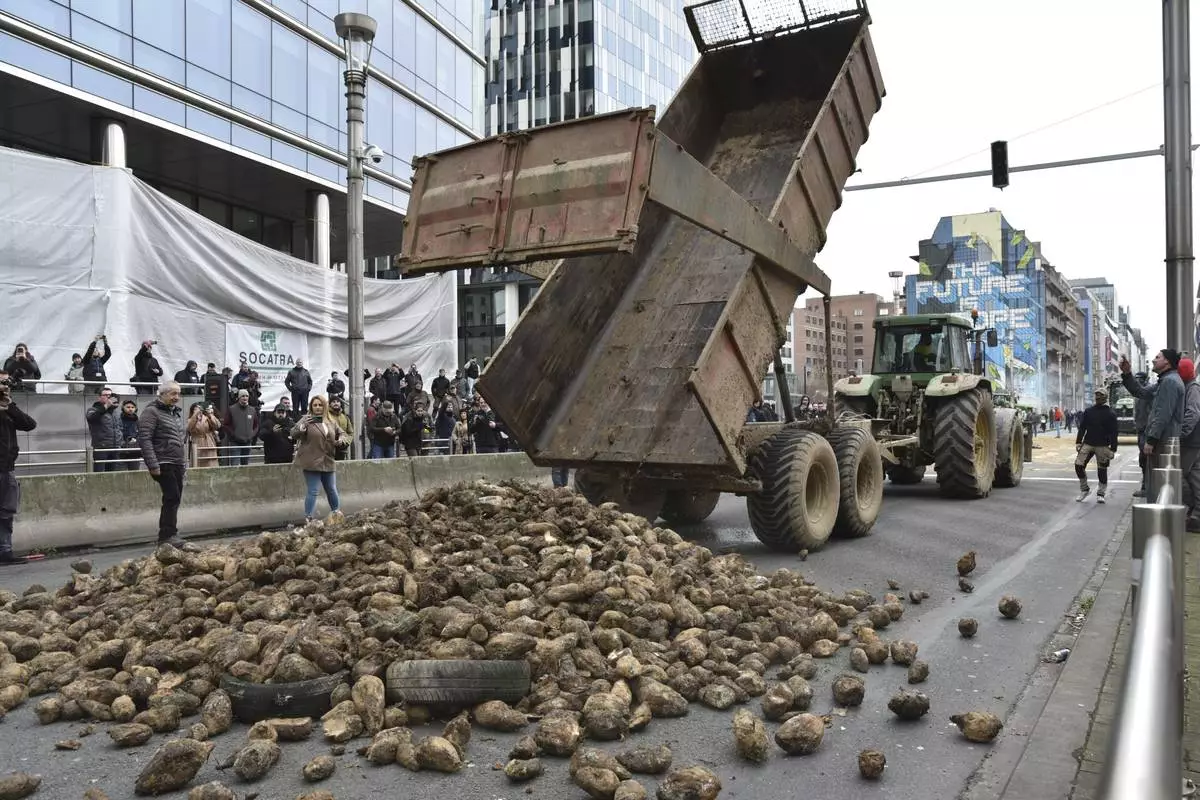
FILE - Protesting farmers dump a load of produce onto a main boulevard during a demonstration outside the European Council building in Brussels, on March 26, 2024. Across the EU, long convoys of tractors have cut off economic lifelines like ports and beltways around major cities, sometimes for days on end, with costs to industry running into the tens of millions daily and keeping hundreds of thousands of people from going to work. (AP Photo/Harry Nakos, File)
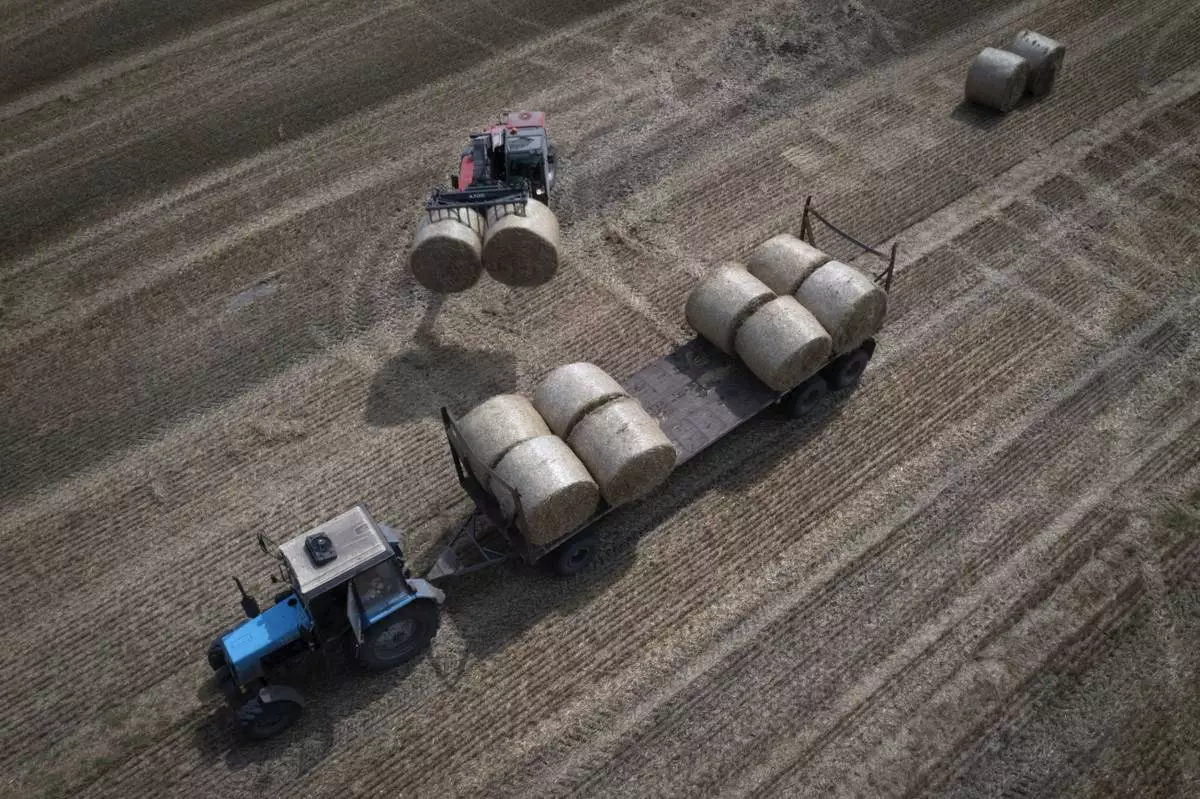
FILE - A tractor collects straw on a field in a private farm in Zhurivka, Kyiv region, Ukraine, on Aug. 10, 2023. Add the Ukraine war and the EU's decision to give the embattled nation sizeable leeway to export its cheap produce that often doesn't even have meet strict environmental standards that EU farmers face, and it makes for a perfect storm just as the EU-wide elections are drawing near. (AP Photo/Efrem Lukatsky, File)
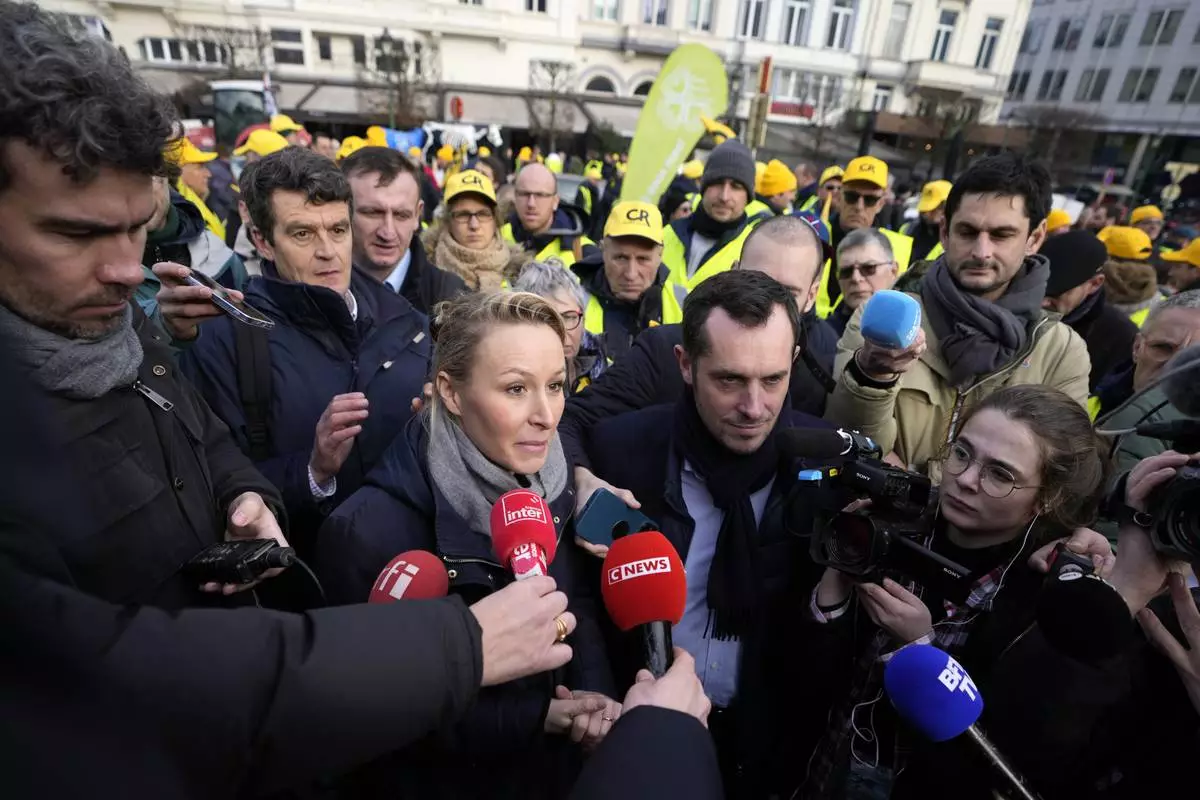
FILE - Marion Marechal, Marine Le Pen's niece and Executive Vice President of French far-right party 'Reconquete', center, speaks with farmers and journalists during a demonstration of French and Belgian farmers outside the European Parliament in Brussels, on Jan. 24, 2024. (AP Photo/Virginia Mayo, File)
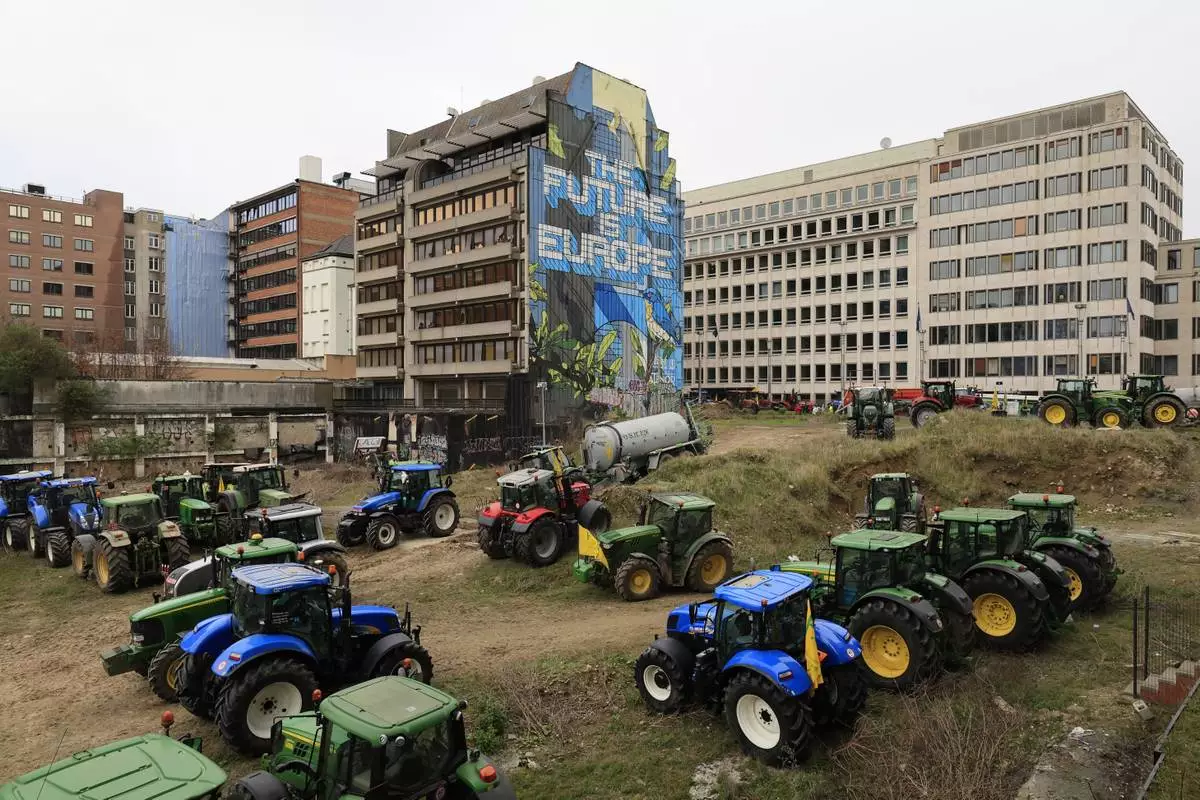
FILE - Farmers park their tractors near the European Council building in Brussels during a demonstration on March 26, 2024. Across the EU, long convoys of tractors have cut off economic lifelines like ports and beltways around major cities, sometimes for days on end, with costs to industry running into the tens of millions daily and keeping hundreds of thousands of people from going to work. (AP Photo/Geert Vanden Wijngaert, File)
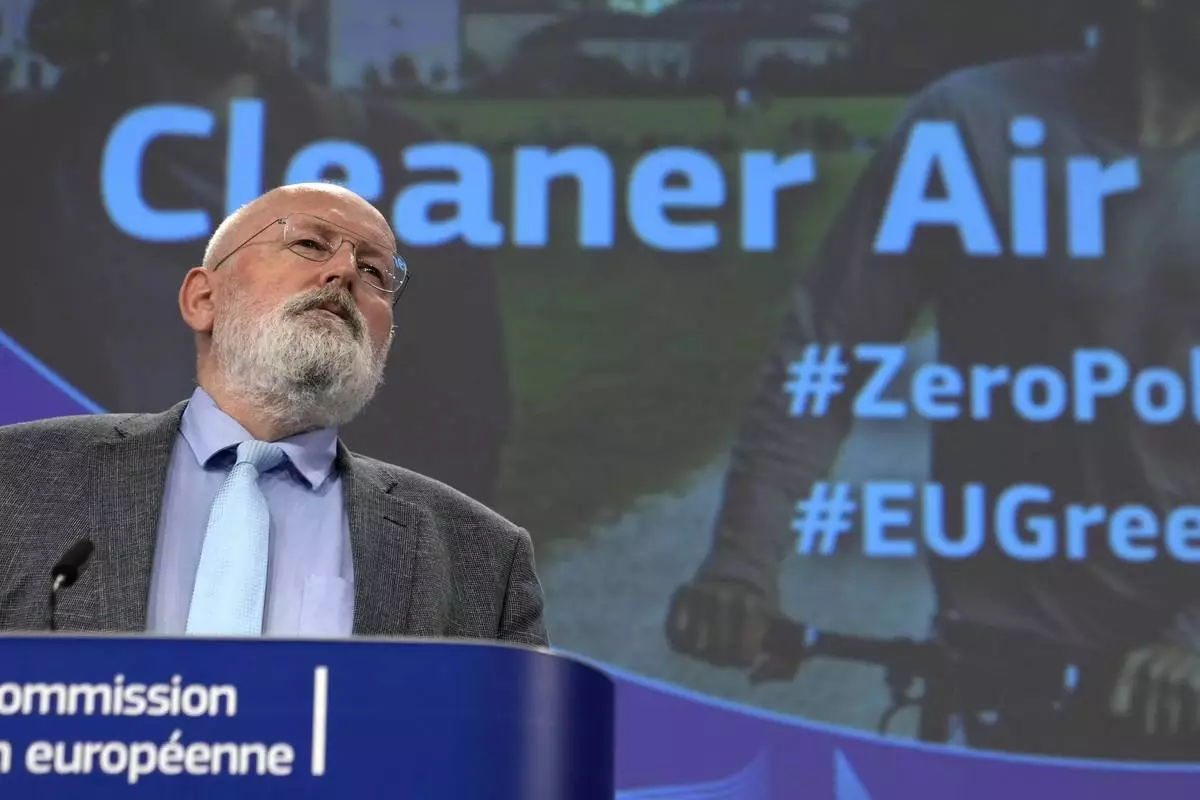
FILE - European Commissioner for European Green Deal Frans Timmermans speaks during a media conference at EU headquarters in Brussels, on June 28, 2023. The EU is seeking to push through stringent nature and agricultural laws as part of its vaunted Green Deal that needs to turn the bloc into a climate neutral continent by 2050, forcing farmers through drastic changes at a time of financial insecurity. (AP Photo/Virginia Mayo, File)

Farmer's Defense Force vice president Jos Ubels poses for a portrait at his farm in Anderen, Northern Netherlands, Monday, March 18, 2024. Ubels feels that everything from overbearing bureaucrats insisting when farmers should sow or harvest, imposing excessive restrictions on fertilizer and manure use and unfair international competition condoned by the European Union have created a potent mix that has driven him away from mainstream politics. (AP Photo/Peter Dejong)
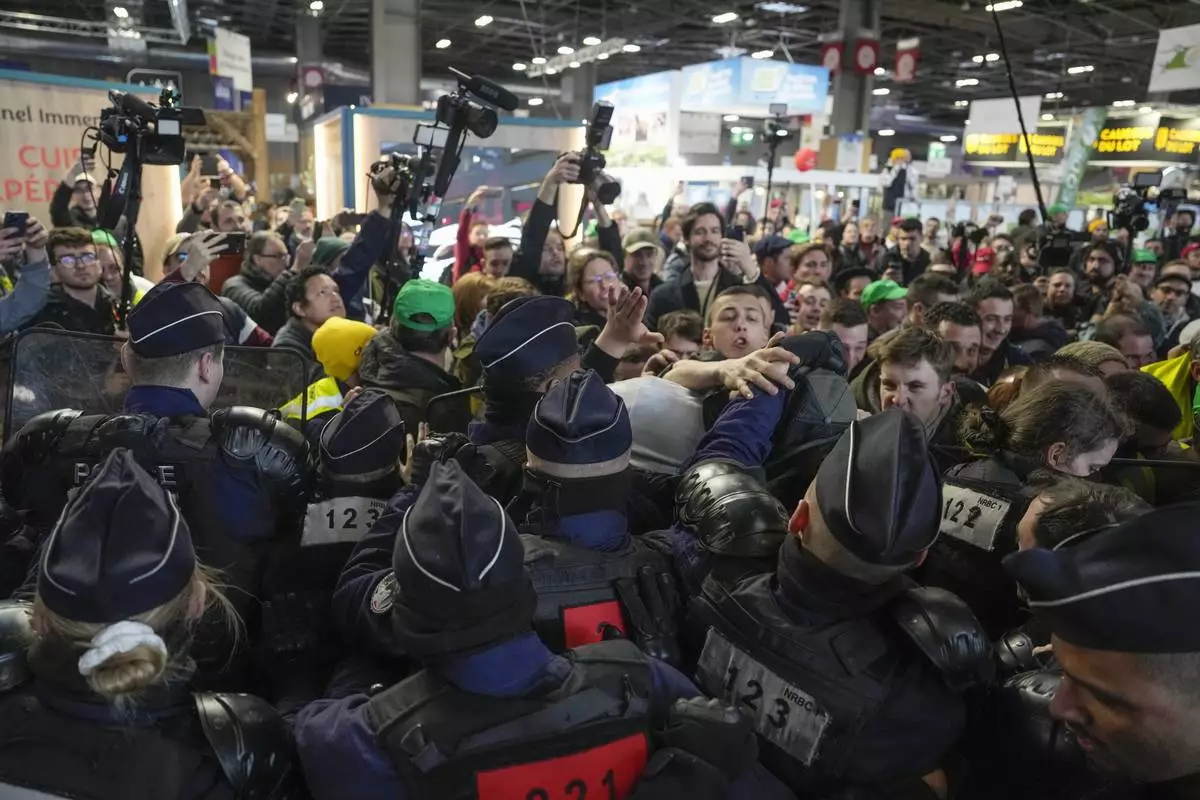
FILE - Angry farmers scuffle with police officers at the International Agriculture Fair as French President Emmanuel Macron tours the exhibition on the opening day in Paris, on Feb. 24, 2024. Farmers across Europe have been protesting for weeks over what they say are excessively restrictive environmental rules. (AP Photo/Lewis Joly, File)

FILE - Polish farmers with national flags and angry slogans written on boards, protest against European Union green policies that trim their production and against cheap grain and other food imports from Ukraine, in Warsaw, Poland, on Feb. 27, 2024. Across the EU, long convoys of tractors have cut off economic lifelines like ports and beltways around major cities, sometimes for days on end, with costs to industry running into the tens of millions daily and keeping hundreds of thousands of people from going to work. (AP Photo/Czarek Sokolowski, File)
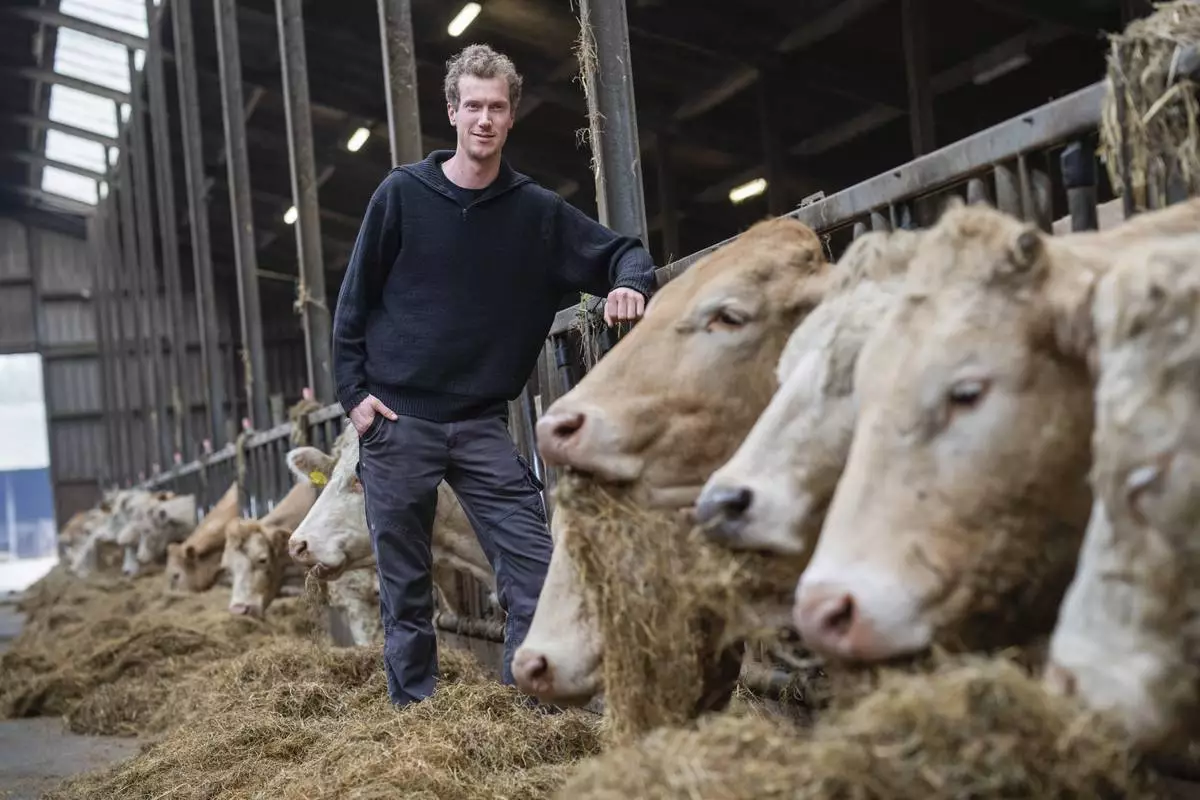
Farmer's Defense Force vice president Jos Ubels poses for a portrait at his farm in Anderen, Northern Netherlands, Monday, March 18, 2024. Ubels feels that everything from overbearing bureaucrats insisting when farmers should sow or harvest, imposing excessive restrictions on fertilizer and manure use and unfair international competition condoned by the European Union have created a potent mix that has driven him away from mainstream politics. (AP Photo/Peter Dejong)



















